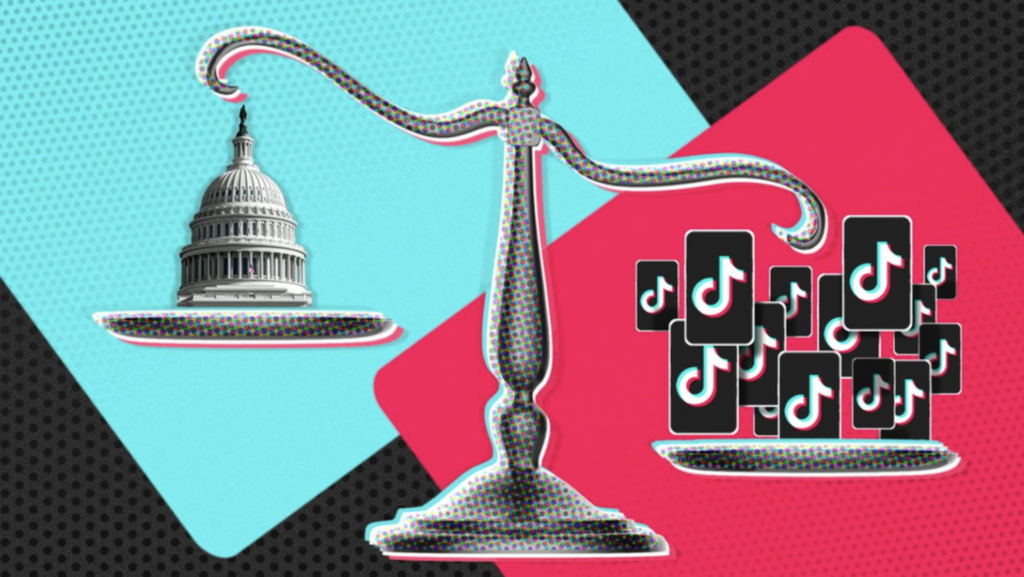Tiktok’s Fate Further Up the Legal System
For a lasting stretch of time, TIkTok, towering titan of the internet, has imprinted itself as a substantial part in the routine lives of umpteen Americans, an estimated 150 million. This copious portion isn’t just made up of casual users, but also creators and small businesses, over 7 million, that not only use the app to advertise, but also as a direct source of revenue from its creator fund and online marketplace. However, the tall conglomerate may stall this Fall, as a wall of bureaucracy stands in its trawl through the attention spans of millions of Americans.
A bill that poses a threat to the existence of TikTok in the United States, its largest user base, is progressing through the Legislative Branch. As of March 13th, the bill was approved by the House of Representatives in a 352 to 65 vote. The “Protecting Americans From Foreign Adversary Controlled Applications Act” states that TikTok’s parent company, ByteDance, must sell the brand to a “qualified buyer,” likely an American company that doesn’t discourage competition or an independent buyer, within 180 days. If ByteDance fails to do so, TikTok will face a ban and be blocked from American app stores and servers. This bill has received overwhelming support from both parties in a rare display of bipartisan agreement.
197 Republicans in favor, 15 against;
155 Democrats in favor, 50 against;
President Biden has affirmed that he would sign the bill into a law if or when it lands in the oval office.
But why should the government bother? The main cause for the bill is the possibility of the Chinese government actively conducting espionage through the platform. One law in China concerning cybersecurity has been a major driver for the claim: the 2017 National Intelligence Law, which obligates Chinese “organizations and citizens” to “support, assist, and cooperate with national intelligence efforts in accordance with law” and “protect national intelligence work secrets they are aware of.”
Additionally, ByteDance’s former Head of Engineering in the U.S. Yintao Yu, has come out stating that the Chinese government can and has used cybersecurity laws to monitor any TikTok user’s personal information, posing a huge breach of security. TikTok CEO Shou Zi Chew has repeatedly denied these claims, although TikTok is banned in China, existing as a government regulated and censored platform named Douyin.
The fate of TikTok, its millions of users, investors, small businesses, and creators, as well as the economic basis of the nation, now lies in the hands of the U.S. legal system, Senate, and President Biden. The decision about the future of this nation’s free-market style economy and whether government intervention in TikTok will threaten the rest of the American market with the imminent danger of a government willing to wring out any disagreeable business, is at stake. It is also in the hands of the Senate and President Biden to determine the future of millions of Americans’ private data, and whether it is much worse in the hands of China. Finally, it is up to the American people to decide whether American policy’s future lies in benefiting the people or authorising a quest for power.
You may be interested
Farewell From the 2024-25 Editor-in-Chief
Kat Torres - May 29, 2025Finding the words to express how I truly feel has been more difficult than I expected. How do you begin to say goodbye…

The Heart and Soul of Our School
Daniella Prieto - May 29, 2025At John A. Ferguson, some of the most meaningful work is happening quietly, all through structure, patience, and consistency. Inside the ASD (Autism…

Chick-fil-A vs. Raising Cane’s: A Clash of Chicken Titans
Kristen Almendral - May 27, 2025There have been debates recently over two fast food chains: Chick-fil-A and Raising Cane’s. Both chains are favorites among many. These fast-food chains…
Most from this category

Exciting Summer Getaway Destinations
Tehreem Chaudhry - May 22, 2025
The Chilly Challenge of the Ferguson Classroom
Leydi Morales - May 20, 2025
















